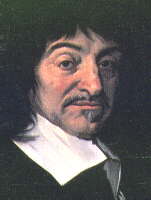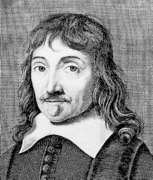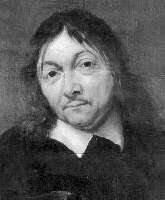47 Rene Descartes

- After receiving a sound education in mathematics, classics, and law at La Flèche and Poitiers, René Descartes embarked on a brief career in military service with Prince Maurice in Holland and Bavaria. Unsatisfied with scholastic philosophy and troubled by skepticism of the sort expounded by Montaigne, Descartes soon conceived a comprehensive plan for applying mathematical methods in order to achieve perfect certainty in human knowledge. During a twenty-year period of secluded life in Holland, he produced the body of work that secured his philosophical reputation. Descartes moved to Sweden in 1649, but did not survive his first winter there.
Although he wrote extensively, Descartes chose not to publish his earliest efforts at expressing the universal method and deriving its consequences. The Regulae ad directionem ingenii (Rules for the Direction of the Mind) (1628) contain his first full statement of the principles underlying the method and his confidence in the success of their application.
 In Le Monde (The World) (1634), Descartes clearly espoused a Copernican astronomy, but he withheld the book from the public upon learning ofGalileo’s condemnation.
In Le Monde (The World) (1634), Descartes clearly espoused a Copernican astronomy, but he withheld the book from the public upon learning ofGalileo’s condemnation.Descartes finally presented (in French) his rationalist vision of the progress of human knowledge in the Discours de la méthode pour bien conduire sa Raison et chercher la Vérité dans les Sciences (Discourse on Method) (1637). In this expository essay, Descartes assessed the deficient outcomes of a traditional education, proposed a set of rules with which to make a new start, and described the original experience upon which his hope for unifying human knowledge was based. The final sections of the Discourse and the essays (on dipotric, meteors, and geometry) appended to it illustrate the consequences of employing this method.
A few years later, Descartes offered (in Latin) a more formal exposition of his central tenets inMeditationes de Prima Philosophia (Meditations on First Philosophy) (1641).
 After an expanded statement of the method of doubt, he argued that even the most dire skepticism is overcome by the certainty of one’s own existence as a thinking thing. From this beginning, he believed it possible to use our clear and distinct ideas to demonstrate the existence of god, to establish the reliability of our reason generally despite the possibility of error, to deduce the essence of body, and to prove that material things do exist. On these grounds, Descartes defended a strict dualism, according to which the mind and body are wholly distinct, even though it seems evident that they interact. The Meditations were published together with an extensive set of objections (by Hobbes, Gassendi,Arnauld, and others) and Descartes’s replies. Descartes later attempted a more systematic exposition of his views in the Principia Philosophiae (Principles of Philosophy) (1644) and an explanation of human emotion in Les Passions de L’Ame (The Passions of the Soul)
After an expanded statement of the method of doubt, he argued that even the most dire skepticism is overcome by the certainty of one’s own existence as a thinking thing. From this beginning, he believed it possible to use our clear and distinct ideas to demonstrate the existence of god, to establish the reliability of our reason generally despite the possibility of error, to deduce the essence of body, and to prove that material things do exist. On these grounds, Descartes defended a strict dualism, according to which the mind and body are wholly distinct, even though it seems evident that they interact. The Meditations were published together with an extensive set of objections (by Hobbes, Gassendi,Arnauld, and others) and Descartes’s replies. Descartes later attempted a more systematic exposition of his views in the Principia Philosophiae (Principles of Philosophy) (1644) and an explanation of human emotion in Les Passions de L’Ame (The Passions of the Soul)
Recommended Reading:Primary sources:
Secondary sources:
Additional on-line information about Descartes includes:
|

